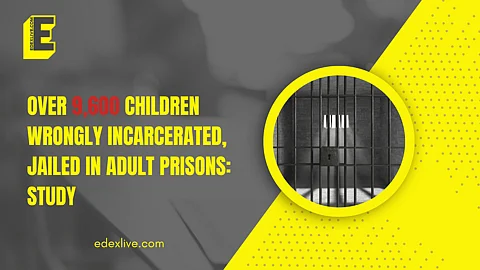

According to the data for the study "Incarceration of Children in Prisons in India" obtained under the Right to Information (RTI) Act, it showed that more than 9,600 children were wrongly incarcerated in adult prisons across India between January 1, 2016, and December 31, 2021, stated a report by PTI.
The study by legal rights body iProbono sheds light on a deeply concerning issue affecting the juvenile justice system in India.
"This means an average of over 1,600 children were transferred out of prisons across the country every year," the study said, referring to the children identified by Juvenile Justice Boards (JJB) and moved to juvenile homes from adult jails.
This figure was collated based on responses to RTI requests by 285 district and central prisons out of a total of 570, stated a PTI report.
Shortcomings in the data collection
The study additionally mentioned that the data collected does not encompass the 749 other prisons for which they did not request data, such as sub-jails, women's prisons, open prisons, special prisons, borstal schools, and other correctional facilities.
Several states failed to adequately respond to inquiries, with notable non-compliance from Madhya Pradesh, West Bengal, Nagaland, and the Union Territory of Ladakh.
States revealed alarming details
In the jails that were successful in providing data, Uttar Pradesh reported that 2,914 children were transferred from prisons to juvenile homes.
In Bihar, where 34 per cent of prisons provided data, 1,518 children were relocated from adult jails.
Madhya Pradesh failed to provide any data despite multiple requests made under the RTI Act. Similarly, West Bengal did not provide any data.
In Haryana, where data was provided by 90 per cent of prisons, 1,621 children were transferred, aligning closely with the number identified during JJB visits.
In Rajasthan, 108 children were transferred, as indicated by data from 51 per cent of its prisons, with a significant lack of information concerning children identified during JJB visits.
Chhattisgarh transferred 159 children, according to data from 44 per cent of its jails, revealing disparities in JJB visitation patterns across prisons.
Jharkhand transferred 1,115 children, also highlighting discrepancies in JJB visitations and identification practices, with 60 per cent of its prisons responding to RTI queries for the study.
Prisons in Odisha and Tamil Nadu exhibited extremely low response rates to the queries, with no children reported to have been transferred from prisons to juvenile homes.
The study found that Delhi demonstrated a highly organised approach to juvenile justice, with clear directives from the Delhi High Court aimed at preventing the incarceration of children in adult facilities.
The data excludes the Union Territory jurisdictions of the Andaman and Nicobar Islands, Dadra and Nagar Haveli and Daman and Diu, and Lakshadweep due to the absence of district and central jails there.
